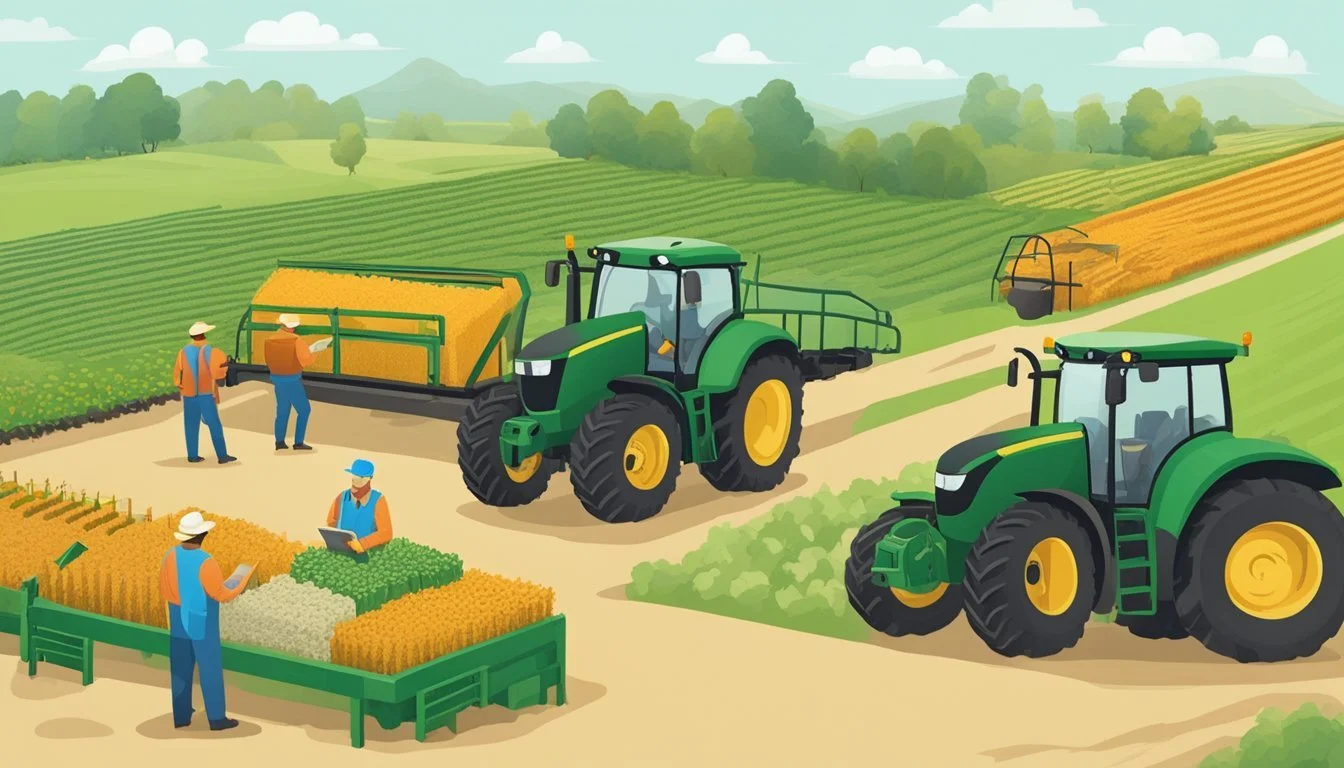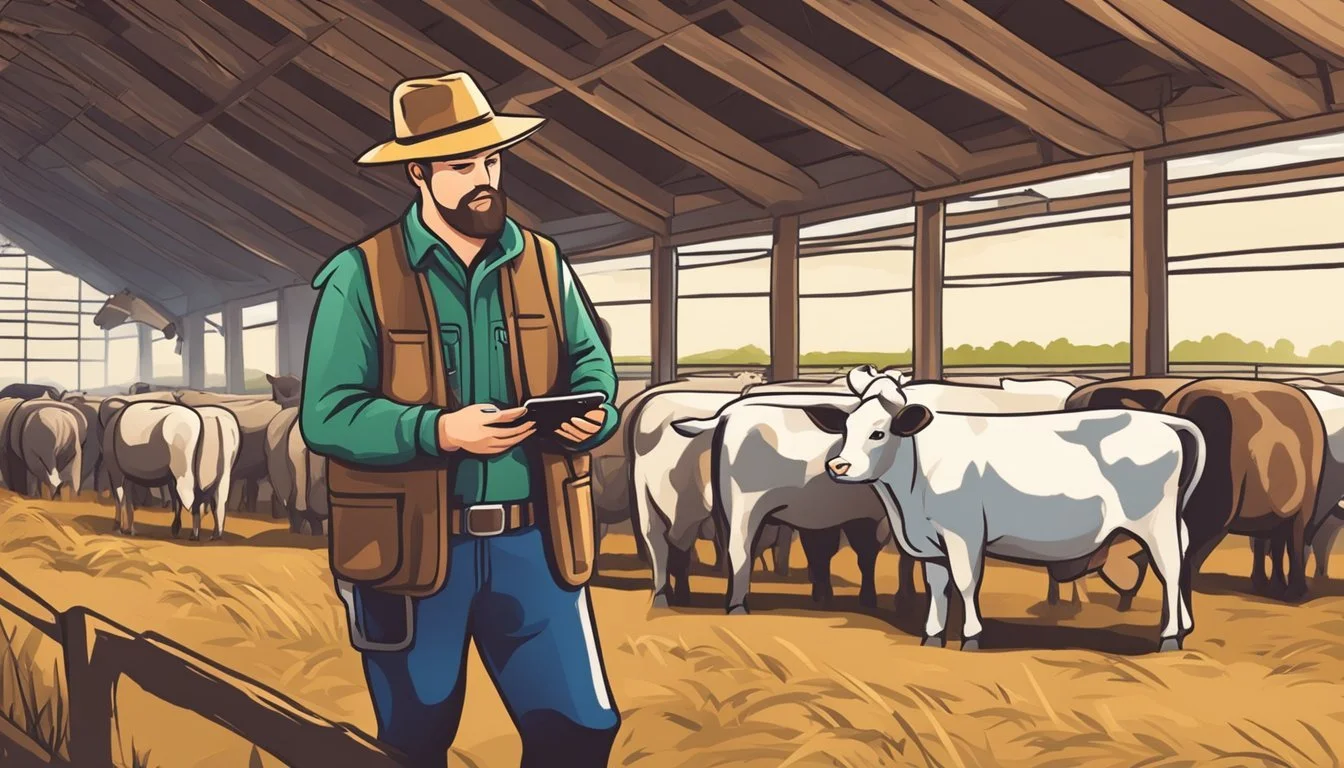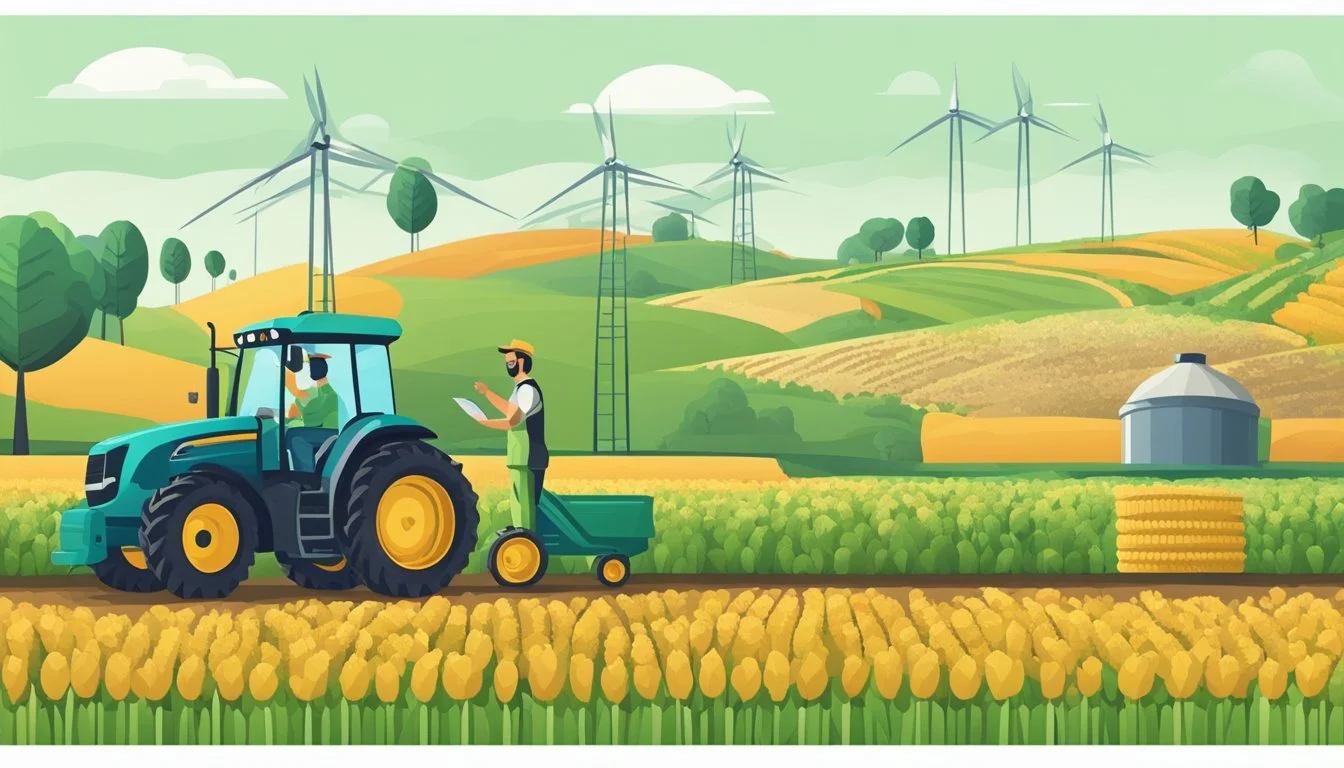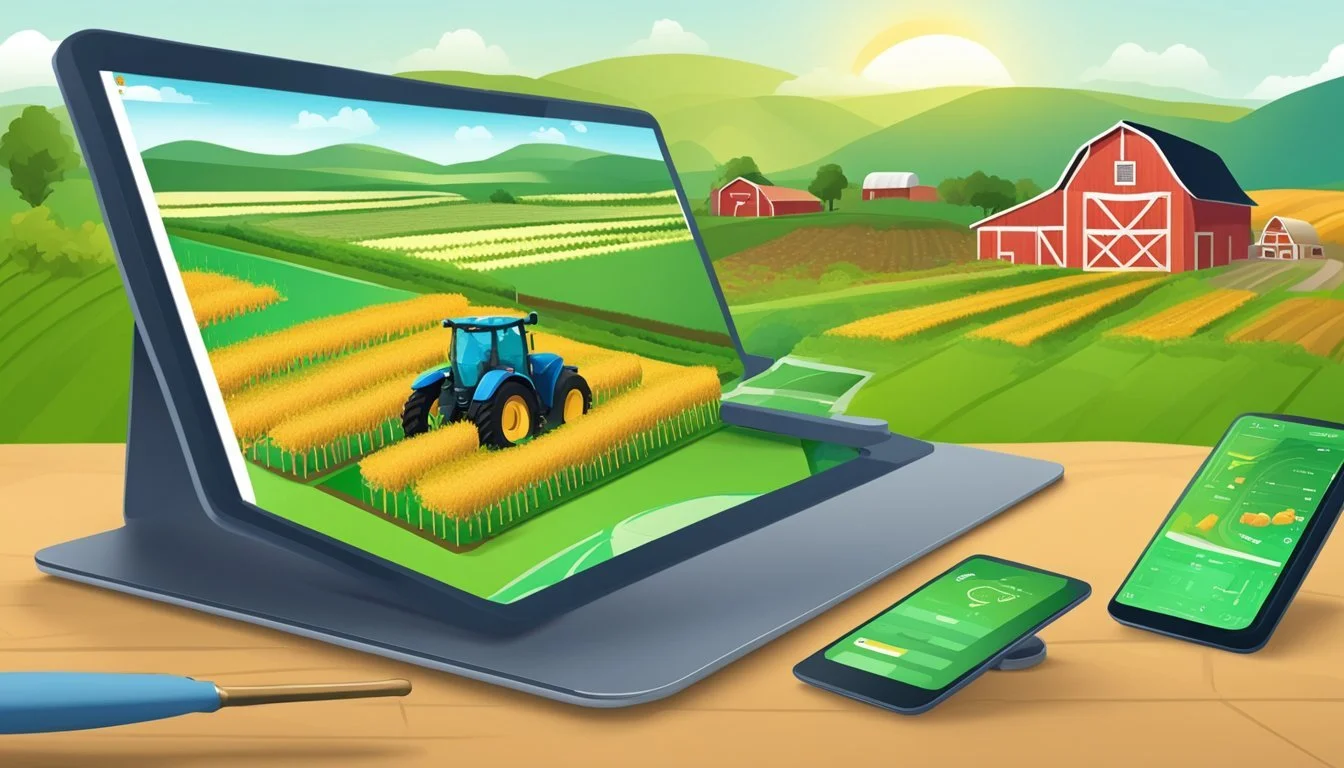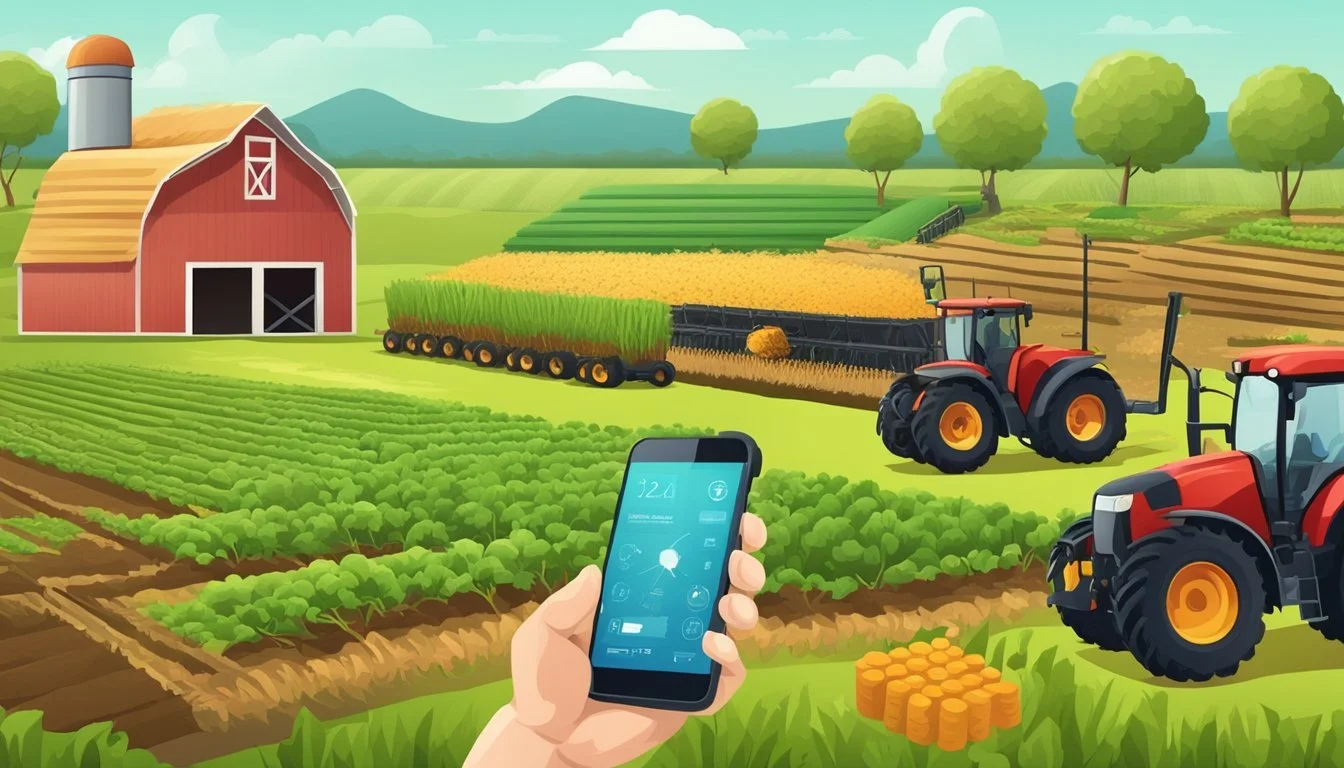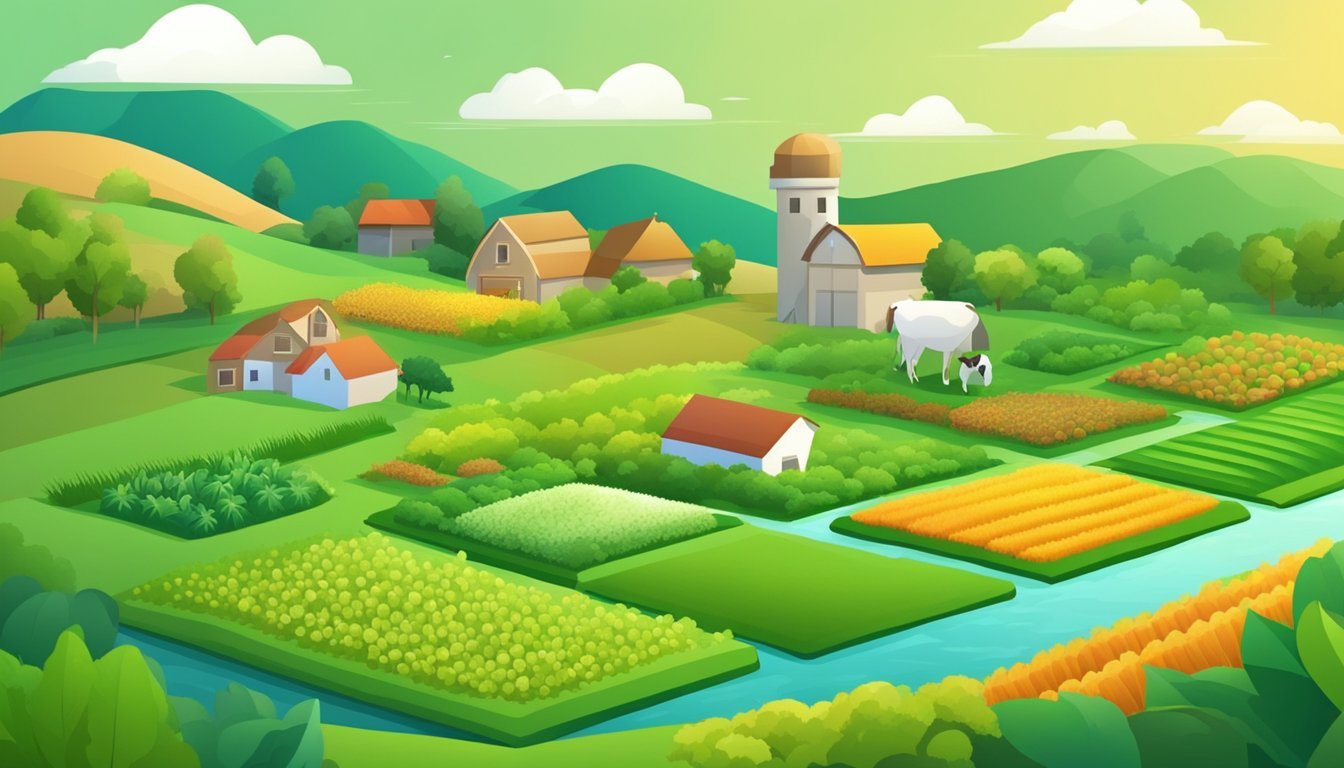The Ultimate Guide to Farm Management
Enhance Your Agricultural Practices with Mobile Tech
In the age of digital transformation, farm management has taken a significant leap forward with the integration of mobile apps, offering farmers on-the-go access to powerful tools and resources. These apps have revolutionized traditional farming techniques, consolidating a variety of tasks such as field monitoring, herd management, and crop planning into a single handheld device. By employing mobile software, farmers are now equipped to make data-driven decisions that enhance productivity and resource efficiency.
The array of mobile applications available in the agricultural sector is diverse, ranging from apps that streamline field task management, like Traction Mobile, to those offering comprehensive farm management systems such as FarmIQ and Granular. These applications provide a plethora of features including real-time data analysis, inventory tracking, and task sharing among farm teams. Farmers can stay updated with the latest information on crop production, soil fertility, and animal husbandry wherever they are, leading to improved operations and profitability.
Significant benefits of incorporating mobile app subscriptions into farm management include eliminating paper-based records, boosting productivity through better record-keeping, and facilitating quick access to field profitability. The apps are designed to be user-friendly, enabling seamless collaboration among team members and providing a centralized platform for managing diverse farming activities. With these tools, farmers can expect not just to keep pace with modern agriculture but to set the bar for efficiency and success in the industry.
Understanding Farm Management
Farm management is a critical aspect of agriculture that involves strategic planning, organization, and execution of farm operations to enhance efficiency and productivity. It encompasses a myriad of activities including crop production, soil fertility management, and animal husbandry.
Key Components of Farm Management:
Planning: Establishing clear goals and outlining steps to achieve them.
Organizing: Allocating resources such as labor, equipment, and capital effectively.
Monitoring: Keeping track of farm operations and making adjustments as needed.
Decision Making: Choosing the best course of action based on real-time data.
Agricultural professionals implement management strategies to optimize resource use and maximize yields. By focusing on these components, farmers can strategically approach farming activities and ensure that every aspect of the farm operates cohesively.
Benefits of Efficient Farm Management:
Improved crop yields and livestock production
Enhanced soil health and sustainability
Reduced wastage of resources
Better financial outcomes
The integration of mobile app subscriptions into farm management represents a significant leap forward. These digital tools offer on-the-go access to essential resources and data, facilitating informed decision-making processes and real-time management capabilities, which are crucial for today's dynamic farming environment.
The Importance of Mobile Apps in Farming
Mobile apps are revolutionizing the agricultural industry by offering data-driven solutions that enhance operational efficiency. They provide on-the-go access to tools and resources necessary for informed decision-making and improved farm management.
Real-Time Access to Information
Mobile apps equip farmers with real-time updates on vital factors that affect their farming practices. They give immediate access to:
Weather information: Apps provide weather forecasts, helping farmers plan their activities to avoid adverse conditions.
Market data: Access to current market trends helps farmers sell produce at optimal prices.
Soil and water quality data: These apps analyze soil pH levels and water clarity, contributing to precise farming.
Streamlining Farm Operations
Using mobile apps for task management and record-keeping is becoming the new standard. These apps allow farmers to:
Track crop production and soil fertility metrics.
Manage schedules and allocate resources efficiently.
By digitizing operations, farmers minimize errors compared to traditional paper-based systems.
Enhancing Communication and Collaboration
Mobile apps foster better communication and collaboration among stakeholders in the farming industry. They:
Connect farmers with extension services for expert advice.
Enable sharing of best practices among farming communities.
Facilitate coordination between supply chain partners.
Overall, mobile apps are indispensable tools for modern farmers, supporting various aspects of farm management, leading to more efficient and effective operations.
Key Features of Top Farm Management Apps
Effective farm management apps blend functionality with user accessibility to provide robust solutions for modern agribusinesses. They address specific agricultural concerns such as record-keeping, inventory control, and weather responsiveness.
Record-Keeping and Compliance
Farm management apps offer comprehensive record-keeping features to maintain accurate logs of farm activities, from crop cultivation to livestock rearing. They support compliance with agricultural regulations by streamlining the audit process, providing easy-to-use tools to document resource usage, animal health records, and worker activities. Farmers can generate reports swiftly for regulatory reviews, ensuring that they remain compliant with industry standards.
Inventory and Order Management
Inventory systems within these apps allow for real-time monitoring of farm inputs and products. They integrate supply chain functionality to track the flow of goods from acquisition to sale, ensuring optimal stock levels and efficient order fulfillment. Order management capabilities facilitate the placement and tracking of orders, and detailed inventory records help in predicting future supply needs accurately.
Field Mapping and Weather Forecasting
Advanced field mapping tools utilize GPS tracking to offer detailed views of farm plots, assisting in accurate crop management. These apps combine field data with weather forecasting tools to help farmers make informed decisions about planting and harvesting. The forecasting features can provide insights into weather patterns, which play a crucial role in mitigating the risks associated with adverse weather conditions.
Data-Driven Decision-Making with AI and ML
Incorporating Artificial Intelligence (AI) and Machine Learning (ML) into farm management revolutionizes traditional practices, providing precise, data-backed insight into every aspect of farming operations.
Precision Agriculture and Crop Management
Farm managers utilize AI and ML to enhance precision agriculture tactics, enabling them to monitor crop growth meticulously. Such technologies process vast datasets to predict optimal planting schedules and evaluate soil health, leading to actionable insights aimed at maximizing yields. By analyzing satellite images and weather patterns, farmers can apply resources such as water, fertilizers, and pesticides more efficiently, leading to reduced waste and increased crop productivity.
Livestock Management Solutions
AI-driven tools such as CattleMax and Herdwatch have transformed livestock management. These solutions employ data analysis to track the health, breeding patterns, and location of cattle and sheep. This targeted management facilitates informed decision-making, reducing mortality rates, and boosting reproduction success. Their mobile app accessibility ensures farmers can make decisions on the go, keeping an accurate record for each animal to ensure optimal herd health.
Harvest Planning and Execution
When it comes to harvest planning and execution, AI and ML offer valuable insights into the best timelines and methods for harvesting. Real-time data analysis assists in predicting peak maturity of crops, thereby scheduling harvests with precision to avoid loss of produce quality. Moreover, during harvest, these technologies can allocate resources efficiently, foreseeing bottlenecks and suggesting alternate strategies for storage and transportation, ensuring a smooth transition from field to market.
Choosing the Right Farm Management Software
Selecting the right farm management software is a critical decision for modern farmers. It can streamline operations, improve resource allocation, and enhance financial management. Comprehensive tools should offer cloud-based accessibility, intuitive usability, and detailed data analytics to support farming efficiency.
Assessing Software Usability
Usability is paramount when choosing farm management software. Farmers need platforms that are user-friendly and accessible via mobile devices to manage their operations on the go. Usability encompasses a responsive design that adapts to various screen sizes and offline capabilities for areas with limited internet access. The user experience should be seamless, allowing farmers to interact with the software effortlessly, reducing the learning curve and enabling quick adoption.
Financial and Resource Management Tools
Effective farm management software should include robust financial and resource management tools. These are essential for:
Monitoring expenses: Tracking costs to optimize spending and increase profitability.
Resource allocation: Ensuring efficient use of materials and workforce.
Return on investment (ROI) analysis: Assessing the financial viability of different farming practices.
Bearing cost-saving in mind, solutions should offer detailed reports and analytics, helping farmers make informed decisions.
Comprehensive Features
Agricultural producers should prioritize software with comprehensive features that integrate:
Weather data: Utilize live weather feeds to plan and protect farming operations.
Production tracking: Manage crop yields and livestock performance to anticipate market demand.
Farm mapping: Geo-tagging for field mapping is crucial, especially for maintaining organic certifications.
Comprehensive features also include task management, crop planning, and yield tracking, which support a thorough guide to the health of the farm.
Integrating Farm Management Apps with Farming Practices
Farm management apps streamline operations and enhance productivity by aligning modern farming techniques with digital solutions. They facilitate every aspect from crop planning to harvesting, fostering better planning and resource utilization.
Crop Planning and Planting
The first step in successful farm management is Crop Planning and Planting. Farmers utilize management apps like FarmIQ and Agworld to make informed decisions about crop rotations and field allocations. Features such as data capture tools and farm maps enable the creation of planting schedules that take into account soil fertility and historical yield data.
CropTracker: Assists with managing planting schedules
GPS tracking: Enables precise placement of crops, leading to optimal usage of available land
Historical data analysis: Offers insights for future planting strategies
Sustainable Water and Pesticide Use
Sustainability in Water and Pesticide Use is crucial for eco-friendly farming. Mobile apps offer tools for effective water management, helping farmers conserve water through tailored irrigation schedules. These schedules are based on real-time weather data and soil moisture levels. Furthermore, precise application of pesticides is facilitated through integrated GPS systems, ensuring that only necessary areas receive treatment, reducing environmental impact.
Irrigation control: Manage water use efficiently
Real-time weather data: Adapt watering schedules to current conditions
Targeted pesticide applications: Mitigate overuse and promote eco-friendly practices
Smart Farming Technologies
Integration of Smart Farming Technologies has become essential in modern agricultural practices. Farm management applications now incorporate various smart technologies such as sensors and automated systems. These technologies provide farmers with real-time insights into crop health, automate labor-intensive processes, and help track fleet movements, significantly boosting overall farm efficiency.
Sensors: Monitor crop health and environmental conditions
Automated systems: Streamline tasks from feeding livestock to planting
Fleet tracking: Manage machinery and reduce idle time
By integrating these mobile app features, farming practices can be further optimized, resources can be better managed, and sustainability can be enhanced.
Advantages of Using Mobile App Subscriptions
Mobile app subscriptions in farm management offer a range of benefits, from reducing waste to enhancing profitability for farms of all sizes. They provide access to powerful tools that are essential for today’s modern, biodiverse farms.
Cost-Effectiveness and Scalability
Cost-effectiveness is a significant advantage of mobile app subscriptions. They eliminate the initial high costs associated with purchasing standalone software, lowering the barrier to entry for small and large farms alike. Scalability ensures that farms only pay for the services they need, with the option to adjust subscriptions as the farm’s requirements change over time. This adaptable pricing model helps manage finances more effectively.
Small farm: May opt for basic features at a lower cost.
Large farm: Can choose comprehensive tools that match their complexity.
Access to Powerful Tools for Small to Large Farms
Farms of all sizes have access to an array of powerful tools through mobile app subscriptions. From AgriWebb, which offers livestock and pasture management, to CropTracker, which aids in crop management and regulatory compliance, these apps provide a centralized location for essential farming data. This enables farmers to:
Track and analyze crop production.
Manage soil fertility.
Monitor animal husbandry.
The convenience of on-the-go access to these tools through mobile devices equips farmers to make more informed decisions in real-time.
Customizable and Scalable Farming Solutions
Customizable mobile app subscriptions cater to the unique needs of biodiverse farms, allowing them to select and adjust the functionalities as their operations evolve. The flexibility of subscription-based apps provides solutions that can grow with the agricultural business, maintaining relevance and usefulness regardless of the farm's scale or the diversity of its crops and livestock.
Customizable reports: Tailor data to meet specific management needs.
Scalable solutions: Adapt to changing business models with ease.
Case Studies and Success Stories
This section showcases real-world scenarios where mobile app subscriptions have significantly enhanced farm management practices, focusing on production, profitability, compliance, and operational efficiency.
Maximizing Production with Mobile Apps
Agworld and AgriWebb are at the forefront when it comes to leveraging mobile applications to boost production. Farmers using AgWorld's intuitive platform have reported a marked increase in yields due to precise tracking and management of farm tasks. In a recent success story, a grain producer utilized Agworld to streamline his crop planning and management, which resulted in a 20% increase in production within the first year of adoption.
Entity: Agworld
Outcome: 20% production increase
Method: Precise tracking and task management
Improving Profitability and Compliance
Agrivi plays a pivotal role in improving farm profitability and compliance reporting with its comprehensive toolset. A vineyard owner, by subscribing to Agrivi's services, managed to not only enhance grape yield but also stay ahead of compliance requirements through timely and accurate reporting. The profit margins saw an improvement as Agrivi's analytics helped in identifying cost-effective practices that aligned with market demands.
Profitability Increase: Yes
Compliance: Enhanced reporting
Market Alignment: Identified through Agrivi analytics
Enhancing Operational Efficiency
Case studies involving Granular and FarmLogs reveal significant advancements in operational efficiency. For instance, a diversified farming operation reported that after integrating Granular's suite of farm management tools, they experienced a 30% increase in operational efficiency due to improved logistics and storage management. FarmLogs has been instrumental for many small to medium-sized farms in optimizing task management, leading to better resource allocation and reduced waste.
Entity: Granular
Efficiency Increase: 30%
Functionality: Improved logistics and storage management
Entity: FarmLogs
Benefit: Optimized task management
Result: Better resource allocation and reduced waste
Managing Challenges and Adapting to Weather Patterns
Farm management is increasingly reliant on adapting to the dynamic nature of weather patterns. Mobile app subscriptions have revolutionized the agricultural industry by providing on-the-go access to tools and resources that enhance a farmer's ability to make swift decisions in response to changing weather conditions.
Weather conditions vary and can have a profound impact on farming operations. Utilizing mobile apps, farmers can receive granular insights into these conditions with real-time data. Apps often feature weather forecasts that help in planning and executing tasks that are highly dependent on weather, such as planting and harvesting.
Short-term forecasts: Enable farmers to make day-to-day decisions to protect crops and livestock.
Seasonal trends: Help farmers plan for planting, pest control, irrigation, and harvesting schedules.
To effectively manage and adapt to weather patterns, these tools can provide historical weather data, which is imperative for understanding long-term trends and making future operational adjustments. In addition, mobile apps can offer:
Alerts for extreme weather events.
Recommendations for crop varieties suited for current climate trends.
Advice on water management during droughts or floods.
Tips on how to protect livestock from adverse weather.
Farmers leveraging these mobile app resources can better manage their resources, limit risk, and enhance efficiency—ultimately securing their livelihood against the uncertainties brought forth by climate change.
Optimizing Agricultural Supply Chains
Effective management of agricultural supply chains can significantly boost farm efficiency. Mobile app subscriptions provide on-the-go access to essential tools and resources, streamlining operations from production to distribution. They emphasize precision and timeliness, vital for today's farmers managing tractors, fertilizers, and other resources.
Mobile tech enhances real-time tracking of tractors and other machinery, ensuring optimal fieldwork scheduling and maintenance planning. Inventory management apps keep tabs on fertilizer stocks, enabling data-driven decisions for procurement and use, minimizing waste.
Modern supply chain management apps offer:
Planning Features: For timely planting, harvesting, and market delivery.
Data Analytics: Insights into demand forecasting and operational efficiency.
Collaboration Tools: Facilitate communication between stakeholders.
Well-structured supply chains are resilient, adapting to market shifts and unexpected challenges. Mobile tools help in:
Monitoring conditions
Coordinating logistics
Ensuring a steady flow of goods.
They support farmers in making evidence-based decisions, impacting the supply chain's overall productivity and sustainability. Leveraging such technologies, agriculture professionals can effectively synchronize the flow of products, information, and resources.
Evolving with Technological Advancements in Agriculture
As they step into the future, farmers are increasingly embracing advanced technological solutions to optimize farm management. The integration of innovative tools has not only streamlined operations but also opened up new avenues for increased productivity and sustainability.
Mobile App Subscriptions: Essential Toolkits for Farmers
Real-time Data Access: Farmers use apps for instant updates on weather patterns, soil health, and crop status.
Resource Management: Applications offer guidance on the optimal application of manure and fertilizers.
Animal Husbandry: Livestock managers benefit from tracking and health monitoring features.
Technology's Impact on Productivity
Precision Agriculture: GPS and data analytics allow for precise planting and resource distribution, minimizing waste.
Automated Systems: Drones and robotic machinery perform tasks like seeding and harvesting, reducing labor costs.
IoT Devices: Networks of sensors provide crucial data, enabling farmers to make informed decisions quickly.
The commitment to innovation aligns with the overall growth strategy in agriculture. Cutting-edge technologies such as Machine Learning and AI facilitate smart farming by analyzing vast amounts of data for predictive insights, further refining farm management strategies.
Table 1: Technological Solutions in Farming
Technology: Mobile Apps; Benefit: Accessibility and convenience
Technology: Precision Agriculture; Benefit: Efficiency and waste reduction
Technology: IoT Devices; Benefit: Data collection and analysis
Technology: AI and Machine Learning; Benefit: Predictive analytics
As farmers continue to adopt modern technologies, the landscape of agriculture is being reshaped. The ultimate guide to farm management emphasizes the strategic implementation of these advancements, ensuring that farming's future remains not only productive but also environmentally conscious and economically viable.
Fostering Biodiversity and Sustainability in Modern Farms
Modern farms have a critical role in promoting biodiversity and sustainability within the agricultural industry. Biodiverse farms are beneficial as they support a variety of organisms, creating a resilient ecosystem. Sustainable practices contribute to the protection of these natural habitats while enabling farms to be more productive and efficient.
Crop Diversity: They introduce a range of plant species to reduce pests naturally and minimize disease spread without relying on chemical pesticides. Crop rotation and intercropping can boost soil health and lead to improved yields.
Habitat Creation: By setting aside areas of farmland for wildlife habitats, such as hedgerows, woodlands, and wildflower meadows, modern farms can encourage pollinators and beneficial insects which aid in natural pest control and pollination services.
Water Conservation: Sustainable water management practices include using drip irrigation and rain barrels to optimize water usage. These methods ensure that crops get the water they need without waste, preserving this vital resource.
Soil Management: Sustainable soil management practices, like cover cropping and reduced tillage, help maintain soil structure and fertility. These practices sequester carbon, enhance water retention, and prevent soil erosion.
By implementing a strategic combination of these measures, modern farms can thrive by adopting a more natural and efficient approach to agriculture. This, in turn, strengthens the farm's resilience to climate change and other environmental challenges while also ensuring long-term productivity. Mobile app subscriptions can provide on-the-go access to tools and resources that support these sustainable farming practices.
Financial Management and Reporting
Innovative farm management apps provide robust tools for financial management and reporting, enabling farmers to monitor their profitability and control expenses effectively. These applications bridge the gap between traditional practices and modern technology, offering on-the-go access to vital financial data.
Tracking Profitability and Expenses
A farm's financial health is pivotal to its success. Farm management applications allow users to track income and expenditures in real-time, ensuring that they stay informed about their operation's profitability. They enable farmers to categorize expenses, from seeds and fertilizers to labor and equipment, making it easier to monitor cash flow and financial performance.
Revenue: Tracks sales from crops, livestock, and direct-to-consumer products.
Costs: Records variable and fixed costs associated with running the farm, like input materials and overhead.
Profitability: Provides a dashboard to visualize net profits after accounting for all expenses.
Tools designed for specialized operations such as vineyards integrate specific functionalities tailored to the nuances of viticulture, like tracking harvest yields and managing wine production costs.
Creating Custom Reports for Better Insights
Custom reports are essential for a granulated view into a farm’s finances. Farm management platforms often come with financial reporting tools that allow users to create personalized reports.
Custom Fields: Support varying data points relevant to different types of farms, including CRM-related financial outcomes.
Export Options: Users can export data in formats suitable for further analysis or sharing with stakeholders.
Visual Data Representation: Intuitive graphs and charts enhance the understanding of financial trends.
Financial Reporting through these systems is streamlined, making it less cumbersome and more accurate. Whether it’s a dairy, arable, or a vineyard operation, farmers can benefit from insights tailored to their specific farming activities and financial circumstances.
Future Trends in Farm Management Apps
The landscape of farm management apps is continuously evolving, with technological trends shaping how farmers interact with data. Precision agriculture is expected to be enhanced by machine learning (ML) and artificial intelligence (AI), fostering smarter, more predictive insights for farm operations. These technologies will likely transform decision-making processes on the farm, from crop management to animal husbandry. Real-time data analytics, powered by AI, will enable farmers to respond proactively to changing conditions, ensuring optimal crop yields and resource management.
Furthermore, the integration of IoT devices into farm management apps will improve monitoring and control of equipment. This functionality will not only lead to enhanced equipment performance but also enable the seamless collection and analysis of data for improved farm management.
The market for farm management apps is set to grow with the demand for increased efficiency and productivity. Apps are anticipated to become more user-centric, offering customized recommendations tailored to individual farm needs while supporting sustainable farming practices.
Key Technological Advancements:
AI and ML for predictive analytics
IoT for seamless equipment management
Customization for user-specific solutions
Farm management software will likely provide more comprehensive solutions, covering a wide array of farm tasks and financial management, all within a single platform. This approach will save time and reduce complexity for farmers, who can access a variety of tools and resources on-the-go.
In summary, the future of farm management apps is poised for substantial advancements that will elevate the capabilities of farmers to manage their operations efficiently, sustainably, and profitably.
Conclusion
The integration of mobile apps in farm management has signified a paradigm shift in agricultural practices. These applications offer an array of tools and resources, ensuring that farm management is streamlined and more efficient. Farmers now have the capacity to manage operations remotely, leading to a minimization of manual errors and an increase in productivity.
Mobile app subscriptions have emerged as a pivotal resource, providing farmers with ongoing access to the latest updates and innovations in farm management. These apps are crucial in:
Monitoring livestock and crops: Keeping real-time tabs on health and growth metrics.
Data management: Instantly recording and retrieving farm data.
Resource allocation: Optimizing the use and distribution of farm resources.
The guide provided not only illuminates the benefits of mobile technology in farming but also acts as a navigator through the plethora of app options, each tailored for different farm management needs. Through selective app subscriptions, farmers can harness a custom suite of features suited to their unique operational demands.
Adopting mobile apps into farm management equips farmers with the necessary tools to meet the challenges of modern agriculture head-on. It's a confident step towards a future where agriculture continually adapts to the technological landscape, ensuring sustainability and success in the long term.

